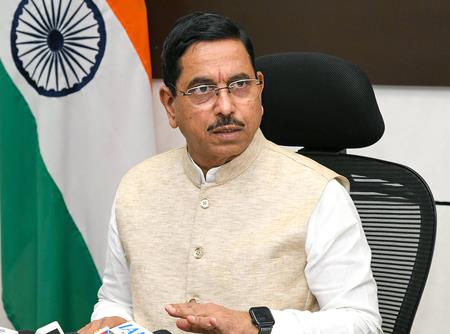Pralhad Joshi To Inaugurate Hi-Tech EV Testing Facility In Kolkata
Equipped with advanced infrastructure, the laboratory will conduct critical tests on EV batteries and components, including electrical safety, FCC/ISED compliance, functional safety, durability, climate tests (IP, UV, corrosion), and mechanical and material safety that includes tests for flammability and glow wire.
The facility will provide EV battery manufacturers, specifically in eastern India, with reliable, internationally-recognised testing and certification, ensuring product safety, performance, and regulatory compliance, according to an official statement.
This facility will serve as a national benchmark for EV quality assurance, providing manufacturers with early fault detection, enhancing product reliability, and ensuring compliance with stringent safety and performance regulations. It will also significantly boost confidence among EV users and accelerate India's journey towards green mobility.
The establishment of this facility reflects the Government of India's commitment to creating a robust EV ecosystem, reducing import dependency, and empowering domestic manufacturers with affordable, testing services.
With this development, NTH reinforces its role as a key enabler in India's transition to sustainable transportation and a global leader in quality assurance infrastructure, the statement said.
EVs are at the forefront of the global transition to eco-friendly mobility solutions, playing a crucial role in reducing dependence on fossil fuels and lowering emissions.
India has set an ambitious goal of achieving 30 per cent EV penetration by 2030. To support this target, it is essential to ensure that EVs and their components undergo rigorous testing, validation, and certification to meet national and international standards, the statement added.
While EVs are currently a small slice of India's passenger vehicle market - penetration is still in single digits - government policies are rapidly changing the landscape. These targeted policies are steadily narrowing the technology and cost gap between India and global leaders like China.
Schemes introduced by the Centre like FAME-II (Faster Adoption and Manufacturing of Hybrid and Electric Vehicles), with a budget of ₹11,500 crore, have already supported over 16 lakh EVs as of June 2025, including e-buses, e-two-wheelers, and e-three-wheelers. A complementary ₹912.5 crore has been sanctioned for installing 9,332 public charging stations, with nearly 8,900 already operational.
These efforts are further backed by the Production Linked Incentive (PLI) schemes -₹25,938 crore for advanced automotive technologies and ₹18,100 crore for Advanced Chemistry Cell battery storage - designed to localise EV components and reduce dependency on imports.

Legal Disclaimer:
MENAFN provides the
information “as is” without warranty of any kind. We do not accept
any responsibility or liability for the accuracy, content, images,
videos, licenses, completeness, legality, or reliability of the information
contained in this article. If you have any complaints or copyright
issues related to this article, kindly contact the provider above.
Market Research

- Gas Engine Market Analysis: Strong Growth Projected At 3.9% CAGR Through 2033
- Daytrading Publishes New Study On The Dangers Of AI Tools Used By Traders
- Excellion Finance Launches MAX Yield: A Multi-Chain, Actively Managed Defi Strategy
- United States Lubricants Market Growth Opportunities & Share Dynamics 20252033
- ROVR Releases Open Dataset To Power The Future Of Spatial AI, Robotics, And Autonomous Systems
- Blackrock Becomes The Second-Largest Shareholder Of Freedom Holding Corp.



















Comments
No comment